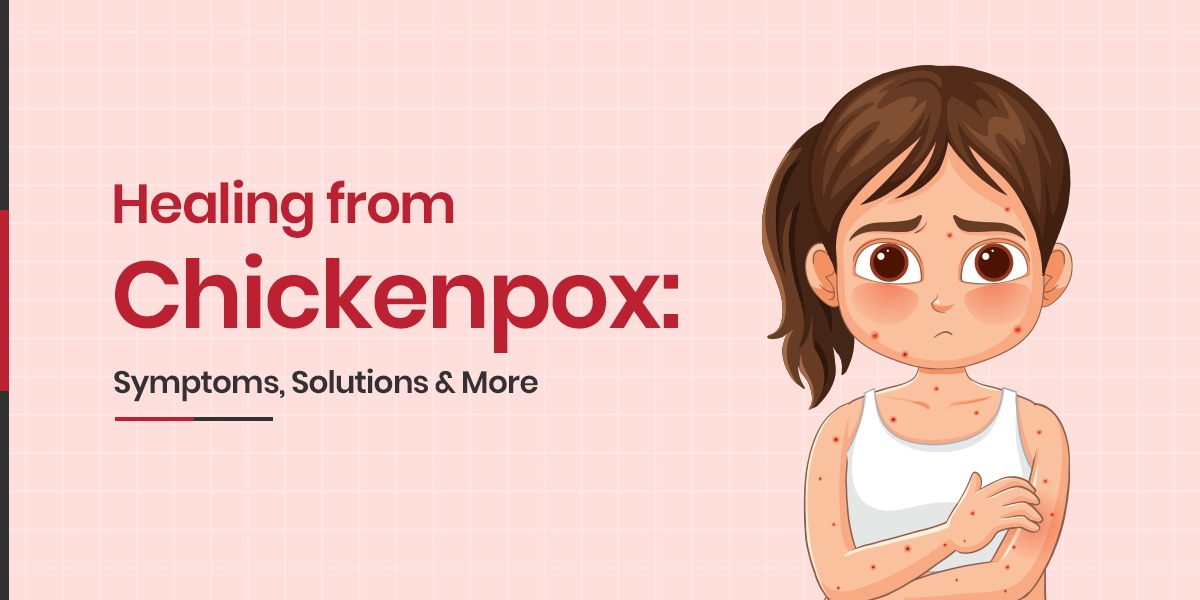Chickenpox: Causes, Symptoms, Treatment & Prevention

Introduction
Chickenpox is a highly contagious viral infection that primarily affects children. It can also affect adults who have never had it or never been vaccinated. Before the introduction of the vaccine, chickenpox was considered a common childhood disease worldwide.
Although it is generally mild, the illness can cause serious health problems for new born, pregnant women, and adults with weak immunity. Understanding its causes, symptoms, treatment, and prevention could reduce its impact and prevent its complications.
What is Chickenpox?
Chickenpox is also known as varicella, as it is caused by the varicella-zoster virus (VZV). The person infected experiences an itchy rash with small, fluid-filled blisters that eventually form scabs. The disease usually lasts about a week. However, it’s contagious period begins one or two days before the rash appears and continues until the blisters have crusted over.
Once a person recovers from chickenpox, they typically develop lifelong immunity. Since it’s contagious, it can spread fast in children. That’s why vaccination helps reduce its impact.
Chickenpox Causes
Understanding chickenpox causes will help us be aware and reduce transmission significantly.
- The varicella-zoster virus spreads through airborne transmission and direct contact. When an infected person coughs, sneezes, or even talks, tiny droplets can be inhaled by others nearby.
- This virus can also spread through direct contact with the fluid from chickenpox blisters or contaminated surfaces.
- Chickenpox can also be transmitted from a pregnant woman to her baby before birth. It can lead to severe conditions, causing congenital disabilities.
Chickenpox Symptoms
Some early chickenpox symptoms include fever, fatigue, headache, loss of appetite, and mild body aches. After initial symptoms, the rash appears. The rash goes through three distinct stages:
- Small, itchy spots develop on the face, chest, and back before spreading to other parts of the body.
- The spots turn into clear blisters filled with fluid, which are extremely itchy.
- The blisters break, dry out, and form scabs as the skin heals.
Chickenpox Treatment
There is no cure for the chickenpox virus. That’s why chickenpox treatment is mainly about relieving symptoms and preventing complications.
- Taking plenty of rest and proper hydration is essential for the body to recover.
- Using paracetamol to control fever and discomfort.
- Applying the lotion and taking cool baths.
- Doctors may prescribe antiviral medicines to lessen severity and avoid any risks.
Conclusion
Chickenpox, once a common childhood illness, can now be prevented through vaccines. Caused by the varicella-zoster virus, it spreads easily and can infect anyone who has not been vaccinated or infected previously. While most cases are mild, infants, pregnant women, and people with a weak immune system are at high risk.
Early detection of symptoms, proper care, and timely medical treatment under the guidance of the best pediatrician in Gorakhpur at Regency Hospitals can help reduce discomfort and prevent complications. With increased awareness, good hygiene practices, and on-time vaccination, the risks associated with chickenpox can be significantly minimized.
Also Read: Down Syndrome in Children: Causes, Symptoms & Early Support
Frequently Asked Questions (FAQs)
What not to eat during chicken pox?
During chicken pox, one must avoid food that is hard to digest. You must avoid spicy, acidic, salty, fried, sugary, processed, or junk foods; nuts; and hard, starchy foods. The best foods during this time are soft, nutritious, and hydrating, supporting your recovery.
Do adults get chickenpox?
Yes, adults too can get chickenpox, though it’s more common in children. Adults who have never had chickenpox or never taken the vaccine are at risk of getting chickenpox. They can experience high fever, rashes, and longer recovery times. But it seems to be more severe in adults than in children.
What to do if my child has chickenpox?
If your child has chickenpox, here’s what you must do:
- Contact your doctor.
- Avoid sending them to the school.
- Use lotion, a cool compress, and oatmeal baths.
- Give medication for the fever.
- Keep them hydrated by increasing their fluid intake.
- Make sure they get proper rest.
How long does it take for chicken pox to go away?
Chickenpox usually lasts for 5-10 days. For the first 1-2 days, one might experience fever, fatigue, and headache. After that, red spots develop into fluid-filled blisters, which burst and form scabs. Once all blisters scab over, after 5-7 days, you are no longer contagious.
What is the fastest way to heal chickenpox?
There is no fast way to heal chickenpox; your body needs time to fight off the virus. However, you can speed up recovery by proper rest and hydration, managing fever and pain, eating immune-boosting foods, and following medical advice religiously.

 Call-an-Ambulance
Call-an-Ambulance



